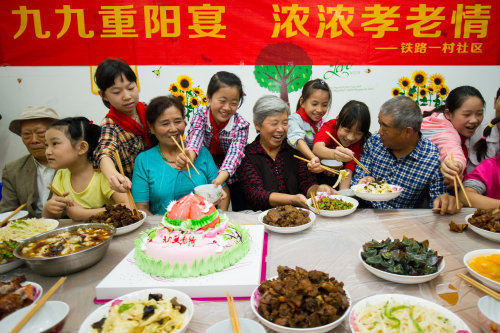 |
|
YOUNG MEETS OLD: Senior citizens enjoy a feast with children at a community gathering in Hefei, east China's Anhui Province, in September 2014. This particular gathering was held to observe the Double Ninth Festival, China's Seniors' Day (DU YU) |
Foreigners living in China agree that Chinese students of all ages are filial: very respectful to their family and elders. My friend Linda Liu explained to me that filial piety remains alive in modern China. This behavior is learned at a very early age, as children learn to read.
"A book, called The Classic of Filial Piety, dates back to some 2,000 years ago," said Linda. "This book offers outstanding behavioral examples to children."
Until the Qing Dynasty (1644-1911) fell in 1911, The Classic of Filial Piety was a textbook for schoolchildren in China. "This book taught and still teaches our children not only how to read but also ethics," said Linda. "And to understand ethics we must also know how filial piety relates to Confucius."
Actually, filial piety became part of Chinese ethics long before Confucius (551-479 B.C.) was born. Shun, a legendary monarch more than 4,200 years ago, is believed to have been the first champion of this virtue, exemplifying it during prehistoric times. Later, while Confucius was still alive, a chaotic period of Chinese history ensued. Confucius asserted that strong ties of mutual interdependence would cement social stability, and to facilitate the creation of those ties, Confucius established the formula for filial piety. For Chinese, this idealized hierarchical ethical structure defines filial piety as a hidden cultural badge of virtue.
Filial piety gradually became a core component of the Confucian ethics. Touching stories of filial models came to be appreciated and were recorded and eventually popularized. More stories were then added to the canon. Since the Han Dynasty (202 B.C.-A.D. 220), each Chinese dynasty has raised admirably filial sons and daughters. As the centuries passed, the stories became part of one central anthology, known as The Twenty-Four Examples of Filial Piety. They personify the ethical implications of Chinese family devotion, as well as devotion to one's ruler and country.
"These stories have survived for thousands of years," said Linda. "They show no signs of losing popularity. It's because they dramatize a fundamental tenet of Confucian thought, a core ideology for all Chinese people: Support and care for the parents should precede all other obligations."
Thus, in China, filial piety implies much more than loving and respecting one's parents. In fact, to understand the larger paradigm of Chinese ethics, one must grasp the true import of filial piety. Confucian ideology requires children to satisfy the wishes of their parents, as well as those of their rulers and elders, and ensure their guardians' safety and well-being at all costs. This implies that children cannot contest the wishes and beliefs of their elders. Parents are always right. Moreover, children should spare no pains in making sure that their parents are safe, healthy and comfortable. In effect, children can never do enough to repay what they "owe" their parents.
"The Twenty-Four Examples are powerful literary tales that condition our children to strive to fulfill Confucius' ideal system. Take for example, the story of 8-year-old Wu Meng. It illustrates how a son should honor his parents. His family was very poor; they had no mosquito net. Every night, Wu Meng sat up and took off his clothes in order to attract the mosquitoes to his own body, so his parents could rest peacefully," said Linda. She also told me the story of a boy named Wang Xiang, who stripped to lay flat on a frozen lake in order to melt the ice with his body heat so that he could fish, because his stepmother wanted to eat some carp. Luckily, the ice cracked and two carp jumped out of their own accord, and the boy happily delivered the fish to his parents.
This concept of children being in the debt of their parents is very different from American ideology regarding child raising. For Western readers of The Twenty-Four Examples of Filial Piety, it may appear that Chinese parents not only take their children for granted, but that they also minimize their importance. This is not true: The Chinese treasure their children. It's just that American parents are socialized to always think about what they should do for their children, while in contrast, the Chinese are traditionally socialized to ask what children should do for them. Parent-child socialization patterns may be different, but this does not take away from the fact that children are nonetheless deeply loved in China.
The author is an American living in Hohhot, north China's Inner Mongolia Autonomous Region
